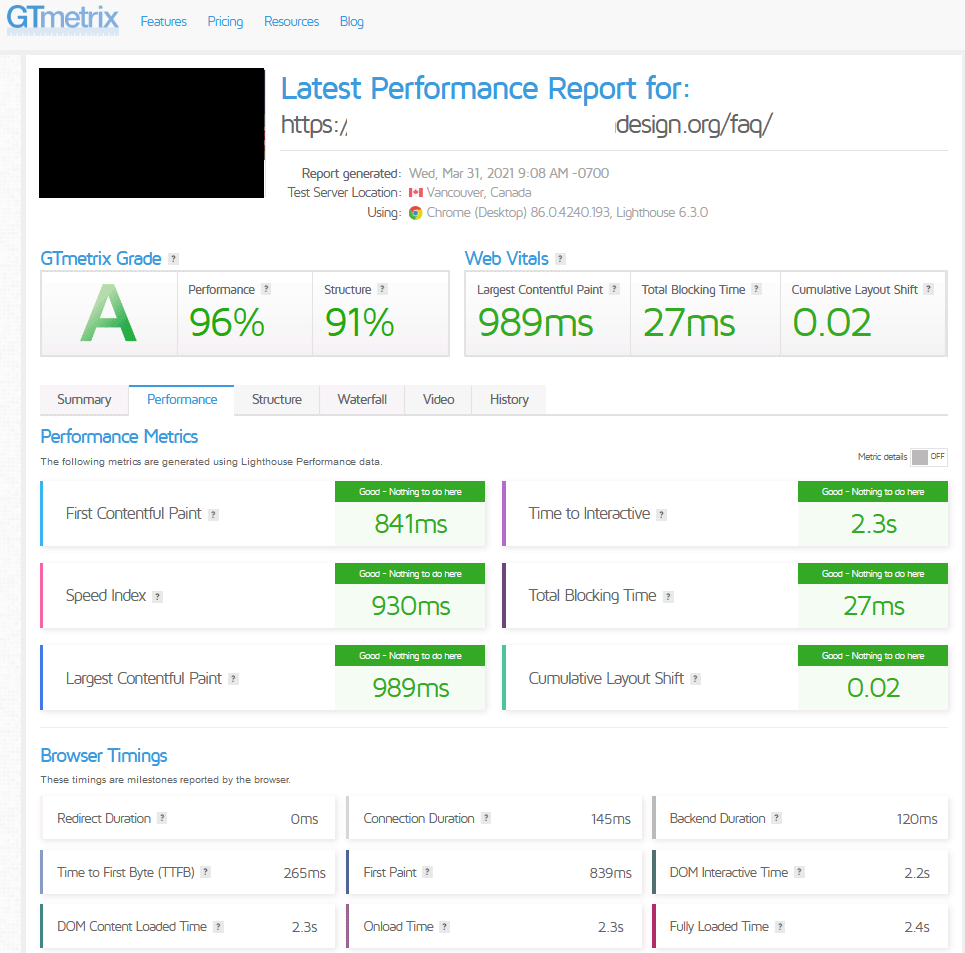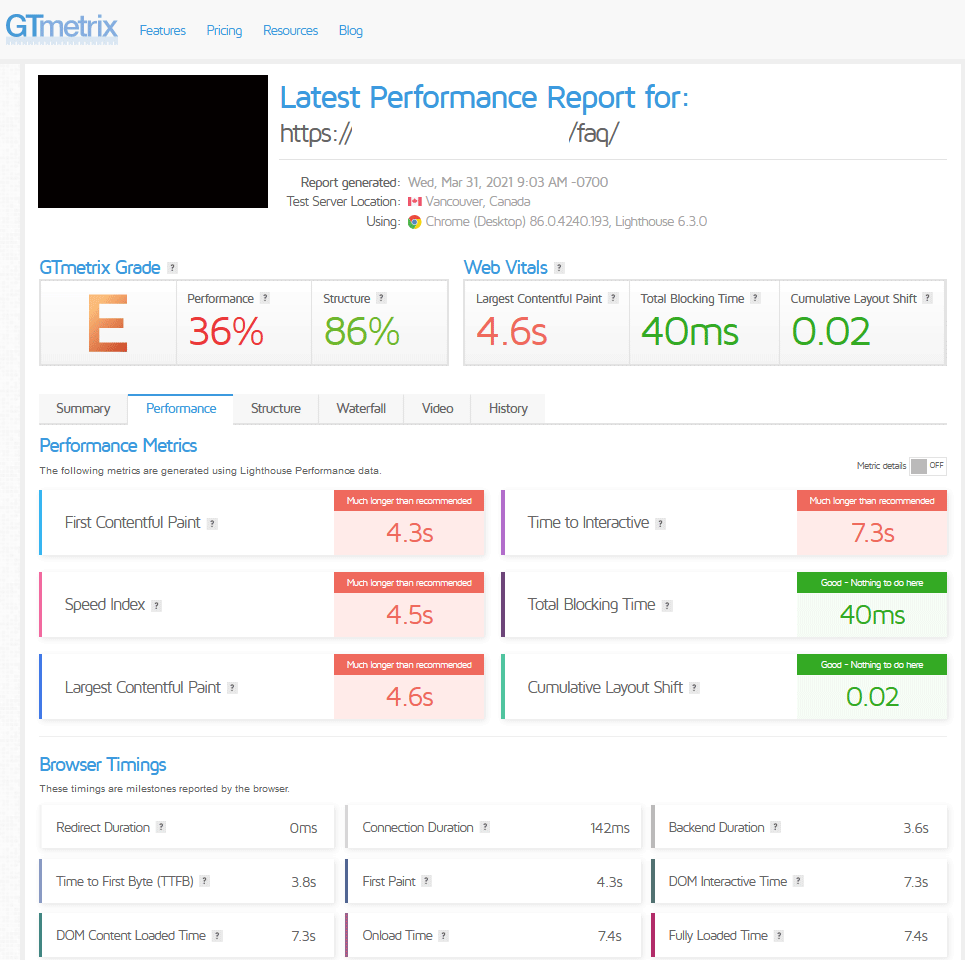As a Digital Marketing Agency, we focus not only on SEO ranking but also on end-user experience. In the good old days (like 5+ years ago), site speed was not always looked at as much as it should have been. Now it is a major SEO ranking factor by Google so it is getting the attention it deserves.
In my opinion, a fast-loading site was and is always important (fast in comparison to other sites you are ranking against) like competing with shopping cart conversions in the case of e-commerce sites. Users have things to do, they do not want to wait 10 seconds to get your site to load and be useable. On mobile (now the dominant search engine metric with mobile-first indexing) your time to keep a user’s attention is very short. Is your audience under 30? under 25? Gulp… teens? Your chance to wow them with speed is increasingly getting shorter and shorter. Gasp… this site took 3 seconds to load, how lame! They simply expect near neural net download speeds!
O.k., I get it, this is old news for many people reading this. For our customers who we rank and build sites, many know they want a quick loading site because it makes their site (and their company) look good. It is not unusual for a new web development client to express frustration with how slow their site loads. Back when I was building sites just for my own use or freelance work, usually for a friends company back in the day, I always focused on image size and finding that balance between image quality and size vs. site load time. In the time of dial-up and 128k DSL image size really mattered. Now in the age of mobile-first indexing and mobile dominance regarding website usage, it matters even more. The mobile experience is what drives your SEO rankings. Images can be a bit larger than before (well a lot larger), but relatively small so they load quickly on a mobile network.
Now here is something many website owners get wrong. They work with a web designer to get their site to look good. They are excited to show it to the world. They need to host it somewhere. They decide to go with an old-name web host that advertises a lot online or on TV etc. and never do any research on how happy people are with that particular website host recently. Sure, some of these lower-end consumer-focused web hosts have been around forever. Many of them were decent back in their prime. However, many have gotten so bad that modern sites can barely load and function. Many have been bought up by a large corporate conglomerate who scoops in, buys them, and keeps marketing under the same name, but cuts costs (and speed and quality). So you have an old user base with fond memories, and all of a sudden their site is not working right. Loads slow etc. and new clients who used these old names before thinking they are the same quality as before.
Recently we built a site for a new client in WordPress on a very popular WordPress development theme. We made sure the images were sized well, installed cache, minimized CSS, HTML, .js files, and set common assets to be served from a free tier CDN. On our testing, the site loads quickly and gets a solid A on GT Metrix. You can see our testing results below for a fairly lightweight FAQ page with 1 header image and some accordion-style FAQ text, and a common footer style image along with a logo. (we used a lightweight page to prove a point with the host the client decided to use vs. a heavier page with video background etc.)

We create and test our development sites on a decent VPS server. Not top of the charts, but a decent mid to mid-high VPS for a development server. A quality shared host will give similar results from an end-user experience for average sites. The lower end (quality not price) hosts give a far worse experience. We will warn our clients against using certain web hosts and recommend a few we know perform reasonably well and give a few options with a few price points for them to choose from. Ultimately it is up to them where to host their site.
We do not host client sites on our servers. We could, but it is a business decision and we do not have 24×7 support staff and as such, do not want that call at 3 a.m. that a site is not loading or loading very slow because the server is being hit with a DDOS attack, a bad neighbor is abusing bandwidth, the server did something unexpected and….. well, you get the idea.
We will move a new site over to production, set up backup options, tweak the server for PHP settings, and standard things like that. We will also maintain sites for clients if asked, so it is in our best interest to have them select a capable host. That also means getting to the bottom of a site that used to load and is now having issues. A poorly run low-powered web host can be the root cause of many issues that simply never happen on a better hosting server.
Here is the that same exact site and page on the clients live shared host that we recommended they not use.

This particular site had an update to its theme recently and a few plugins and the client called to let us know the site was not loading and giving an error. That is always scary for anyone who does not do this for a living (and also for those of us that do)! We install a program on clients’ sites that gives a back door into a crashed WordPress site and we were able to get back into the site and fix the issue. The logs showed that an update was terminated by a chron job that stopped working and it was left in an unstable state and stopped the site from loading. A relatively quick fix which I will spare you the techy details of (my wife is still teaching me no one wants to hear the techy mumbo jumbo).
So in non tech language, the web server got stuck, caused an update to fail, and the site stopped working. I have many sites on this same theme with similar plugins. This was the only one that had an issue. This is not uncommon on lower end hosts.
So I’ll end with this. Research out quality hosts. There are some good shared hosts for sites that only get a few thousand or few hundred visitors a month and are mainly static websites and are not doing ecommerce. There are even some higher end offerings by shared hosts that can run a lower traffic ecommerce site just fine.
Next up you have your managed WordPress hosts. Some of these do cause headaches for SEO managers as they do get your site running fast but do some very bad things SEO-wise when they migrate your site over. (you can fix the issues but you need to know what they are, so again, research), next up are managed and unmanaged VPS servers (go for managed – it is worth the slight premium) and finally full out dedicated servers (go for managed – it is worth the slight premium).
In closing, if you are a website owner or are having a new website site built, I hope you found this article useful. All thoughts are my own, and these are my opinions only. Although I have many years of experience in hosting both large and small sites on anything from shared hosts, VPS servers and dedicated servers, and even servers that were forced to host websites (but really did not want to), please do not take my recommendations without doing your own research!
We offer a full range of Digital Marketing , Website Design and SEO Services for small to mid sized businesses.
At Fulcrum Concepts, we’re here to help you enhance your online presence and reach your local audience more effectively. Contact us at (267) 494-0690 or schedule a short discovery call at www.fulcrumconcepts.com/discovery/

